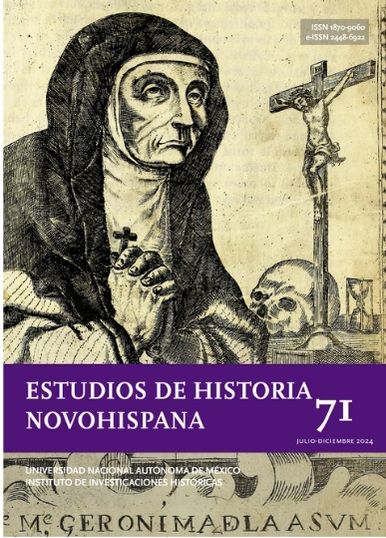Estudios de Historia Novohispana, Núm. 71 (2024)
Envíos recientes
-
Reseña
Alejandro García-Montón, Genoese Entrepreneurship and the Asiento Slave Trade, 1650-1700 (Nueva York/Londres: Routledge, 2022).
(2024)Review of Alejandro García-Montón, Genoese Entrepreneurship and the Asiento Slave Trade, 1650-1700 (Nueva York/Londres: Routledge, 2022). -
Artículo
Genaro Valencia Constantino y Mario Humberto Ruz Sosa, El arzobispado de Guatemala. Documentos sobre su creación (1742-1747) (México: Universidad Nacional Autónoma de México, Instituto de Investigaciones Filológicas, Centro de Estudios Mayas, 2022).
(2024)Review of Genaro Valencia Constantino y Mario Humberto Ruz Sosa, El arzobispado de Guatemala. Documentos sobre su creación (1742-1747) (México: Universidad Nacional Autónoma de México, Instituto de Investigaciones Filológicas, ... -
Reseña
Review of Mark Santiago, A bad peace and a good war. Spain and the Mescalero Apache Uprising of 1795–1799
(2024)Review of Mark Santiago, A Bad Peace and a Good War. Spain and the Mescalero Apache Uprising of 1795-1799 (Norman: University of Oklahoma Press, 2020). -
Reseña
Nicole von Germeten, The Enlightened Patrolman. Early Law Enforcement in Mexico City (Lincoln: University of Nebraska Press, 2022).
(2024)Review of Nicole von Germeten, The Enlightened Patrolman. Early Law Enforcement in Mexico City (Lincoln: University of Nebraska Press, 2022). -
Reseña
Muriel Laurent, ed., y comp., El sello de Amberes. Libros flamencos en Santafé, siglos xvi y xvii (Bogotá: Ediciones Uniandes/Universidad del Rosario, 2021).
(2024)Review of Muriel Laurent, ed., y comp., El sello de Amberes. Libros flamencos en Santafé, siglos XVI y XVII (Bogotá: Ediciones Uniandes/Universidad del Rosario, 2021). -
Artículo
Funerary Emblems in Manila and the Rise of Devotion to Jerónima de la Asunción, OSC (1555-1630)
(2024)This paper examines a collection of 42 funerary emblems, or jeroglificos in Spanish, crafted in honour of the Spanish Abbess Mother Jerónima de la Asunción (1555-1630), the foundress of the first female monastery in the ... -
Artículo
A “Large and Undisciplined” Clergy: Utopia and Reality of Reform to the Secular Clergy in the Archbishopric of Mexico, 1764-1810
(2024)This paper analyzes the reform of the secular clergy in the archbishopric of Mexico between 1764 and 1810 in two major regards: the excessive number of priests and their indiscipline. During the eighteenth century various ... -
Artículo
The Questionnaire of the Cortes of Cádiz: notes and Reflections on the Ethnographic Potential of its Responses
(2024)This article aims to spark academic interest in exploring and analyzing the responses to the questionnaire issued by the Cortes of Cádiz in 1812. This questionnaire was designed to collect detailed information about the ... -
Artículo
The Site of Cuautla: An Approach to the Knowledge of the Insurgents from Prosopography and Infidelity (1812)
(2024)This research analyzes three fundamental aspects of the siege of Cuautla: the reasons that motivated thousands of Cuautla residents to enlist in the insurgent ranks of priest Morelos, the causes that later led them to ... -
Artículo
“The Real Reason for Censorship, in my Opinion”: Satire and Scandal in the Diario Literario de México (1768), Alzate’s First Gazettes
(2024)The Diario Literario de México (1768) by José Antonio de Alzate y Ramírez was suspended after only eight issues. This article puts forth a new interpretation of the events that led to the revocation of the printing license, ... -
Artículo
Suicides, Epidemies and Death in a Collera of Apache (n’dé) Women and Children en Route to Mexico City (1789-1790)
(2024)This article presents as a general objective the analysis of a collera (group of prisoners), composed almost entirely by apache (n´dé) women and children which was forcefully removed from the villa of Chihuahua and sent ... -
Artículo
“A estos ídolos les levantaban humilladeros”: Rhetoric of the Evil in the Work by Andrés Pérez de Ribas (1645)
(2024)This article seeks to analyze the Jesuit rhetoric in the work Historia de los trivmphos de nuestra santa fee entre gentes las más bárbaras y fieras del nueuo orbe, written by the Cordovan Andrés Pérez de Ribas and published ...














